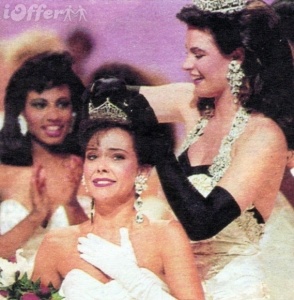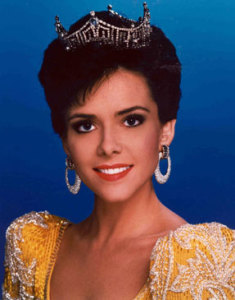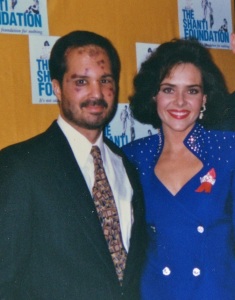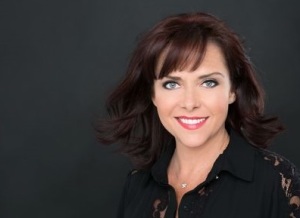When Miss Florida 1992, Leanza Cornett, competed for the crown of Miss America 1993, she didn’t just have gay hearts aflutter over our love for pageant competitions. We adored her because she proudly chose an AIDS awareness platform — and she meant it down to her lovely bones.
 When she won, she made good on her promise to bring HIV issues to an audience that wasn’t used to Miss America hanging out with dying gay men or performing condom demonstrations.
When she won, she made good on her promise to bring HIV issues to an audience that wasn’t used to Miss America hanging out with dying gay men or performing condom demonstrations.
My interview with the groundbreaking title-holder is proof that, more than twenty years later, she is as feisty as ever. Our chat includes her HIV advocacy memories, some backstage dish from the pageant, recovery, sex, her love for the gays, and whatever happened to that jeweled, delicate crown.
Tell me about your exposure, as it were, to the AIDS crisis prior to becoming Miss Florida in 1992. Was it already on your mind?
The first time I heard the word “AIDS” I was 11 years old. It was 1982 and I heard a newscaster say the word and what I remember most was that it was a disease that was killing people. I was in my very small Appalachian hometown of Big Stone Gap, Virginia, and I went into full panic mode because I had eaten almost an entire box of what I thought was candy, called “AYDS” at my grandmother’s house. (AYDS was a chocolate diet suppressant, I found out later). So, as an 11 year old, I thought I was surely doomed. Fast forward, as years progressed so did the disease and thankfully so did our knowledge. When I was 16, I began working professionally in theater and met someone living with AIDS, an actor and a friend. Suddenly, the news story had a face, a name and a relationship with me.
During 1991, the year you were crowned Miss Florida, nearly 30,000 people in the US died of AIDS, and it was the leading cause of death among those age 24-44. It’s sometimes easy to forget the nightmare of those statistics.
By 1991, I was volunteering at two different places in Florida. Hope and Help, was an HIV service organization in Orlando. I did everything from answering phones to taking clients to doctor appointments. That’s where I met Guy Carswell, who became my best friend. I took him to appointments where he would have his Karposi Sarcoma (KS) lesions frozen off. I left every appointment with him in tears but also feeling incredibly empowered that the doctors were making strides toward a cure.
I saw an article in the Orlando Sentinel about a couple who had decided to take in foster children that were born with HIV. Jim and Charlene White turned their home into a non-profit organization called Serenity House and I began volunteering twice a week, taking care of those sweet children. Some were newborn infants and a few were toddlers. It was that year that I competed in Miss Florida and won. So yes, it was very much already on my mind and a huge part of my life.
Was AIDS your platform for the Miss Florida pageant?
No, and I regret that. I listened to people who said I’d never win, it was too controversial. I always felt like that was a compromise I should never have made. But, in the long run, if it had been something standing in the way, I may never have had the national platform I ended up with. Funny how things work out.
 Tell me about how you decided to use AIDS as your Miss America platform, then. I have to assume it wasn’t a popular choice. Did you get pushback from your sponsors or pageant officials?
Tell me about how you decided to use AIDS as your Miss America platform, then. I have to assume it wasn’t a popular choice. Did you get pushback from your sponsors or pageant officials?
I had decided to champion AIDS as my cause going to Miss America no matter what. I met with the Executive Director of Miss Florida and told her and the rest of the Board that it wasn’t an option for me to do or speak out for anything else. The Florida board and everyone I worked with supported me wholeheartedly. I was surprised, simply because in 1992 the only people you heard about as activists were groups like ACT UP.
I absolutely must know about the final moments, among the finalists, before you were crowned and when you name was called as Miss America 1992. Please, spare no emotional detail! I live vicariously for this sort of thing.
I knew I was going to make Top Ten at Miss America, not because I was super egotistical or clairvoyant, but because a hairdresser had seen the list and I was on it and she told me. I even knew where I was in the placement — number six. So I was pretty thrilled with just that alone. Once I made it to the Top Five and I got to speak and answer questions about my platform on stage, that was the cherry on top. For me, personally, that would’ve been enough.
Thank God for video because I honestly don’t remember those final moments except for what I witness in watching it back now. I remember saying to Miss Iowa (Cathy Herd) that she would make a great Miss America. Everyone thought she would win — she was a double preliminary winner. I remember when Regis Philbin announced me as the new Miss America that it must be a mistake. I was wearing white gloves and I remember thinking that they were borrowed and I didn’t want to get makeup on them when I wiped my tears. I thought about the boyfriend who’d broken up with me and hoped he and his whole family were watching. I was just stunned. Completely stunned. Have never been so shocked in my whole life.
Hold on one minute. Your boyfriend broke up with you before the pageant? Is the best revenge winning Miss America?
No, he broke up with me my first year of college, and funny enough, we’re still friends today. But he broke my heart and I wanted to see him squirm, that’s for sure.
I happen to have a sash and crown in the back of my closet, for the 2015 Miss Summer Serenity Pageant, a camp drag thing they do in Washington to benefit people in recovery like me. So, take that. I didn’t cry when I won, I was very regal. Although those sharp stays in the crown were killing me.
I love it that you have a crown and sash…everyone in recovery deserves that but I’m especially glad you won!
Are contestants by and large sincere and gracious behind the scenes, worse, or somewhere in between, like all of us?
I think by the time most contestants get to Miss America, the catty ones have been weeded out. Girls are girls just like gays are gays (laughs) but it’s kept in check during pageant week. It felt less like a competition and more like putting on a great show. I’m still friends and communicate often with several of the girls from my year.
I know gay men who can rattle off former title-holders, their states, and what color they wore for swimsuit. I remember actual squeals coming from my gay friends when we saw you backstage at the Shanti Tribute to Peter Allen in 1993. We’re talking high-pitched sirens of delight.
I’m very, very proud to have been able to speak out on behalf of People Living with AIDS and gay men who probably suffered the most, especially during those early years. I think I confused the lesbians, because they typically hated Miss America, but loved anyone who stood up for AIDS. I was a conundrum!
 Of course, your appearance at that event for Shanti was a bittersweet moment for me, as you know I have written about. You accompanied our founding director, Daniel P. Warner, to the event, and he was covered in KS lesions. You handled yourself with such graciousness toward him, holding tight to his arm.
Of course, your appearance at that event for Shanti was a bittersweet moment for me, as you know I have written about. You accompanied our founding director, Daniel P. Warner, to the event, and he was covered in KS lesions. You handled yourself with such graciousness toward him, holding tight to his arm.
Because I was so closely involved as a volunteer prior to ever winning, I felt really comfortable with a hands on, no-holds barred approach. I was criticized and questioned many times along the way. I remember I was photographed at a hospital kissing a child who was HIV positive and it made the front page of the paper. I got so much mail over that!
Thanks for referring to us as “people living with AIDS” during that time. You know your language.
I was reading an article published in People Magazine about the AIDS epidemic and the journalist kept referring to the people she was profiling as “victims.” I wrote a letter to People, correcting the journalist and explaining how important it was to write about “people living with AIDS” as opposed to victims. They published the letter, and a few months later I was in attendance at a Ryan White Awards banquet and Greg Louganis was a speaker. He cited my letter to People and thanked me for standing up for PLWAs. It was a God-shot for me, proof that standing up and speaking out reaches to so many places.
Speaking of God, you’re a woman of faith, and so many people with AIDS were traumatized by some of the rhetoric by religious fundamentalists during the early years. I’m thinking Jerry Falwell, for instance. How did you reconcile that, or explain to conservatives the importance of ministering, in the truest sense, to those living with the disease?
Great question. Well, I don’t know anyone who hasn’t been traumatized by religious fundamentalists at some point, no matter if it had to do with AIDS or anything else. I definitely felt the sting of that while I was in the thick of advocacy. Thankfully, I have a lot of Biblical training and knowledge, and anytime I felt I had to reconcile anything, I could always refer to the love, the merciful love that Christ shows to all of us. I understand that even more, in recovery, because that gift of powerlessness — knowing that we can’t control what people think or say or believe — it’s very freeing. The most important thing is to love, to show tolerance. I recall telling a minister once, when he criticized me about how vocal I was, that perhaps he should just pray for me and leave the rest to God.
It feels like we still get hung up talking about sex even today, which only benefits the spread of HIV, yet you were teaching people how to use a condom 25 years ago. Is our reticence about sex still the biggest obstacle?
I think we’ve certainly come a long way when it comes to talking about sex, and sexuality. As a parent now, I think the biggest obstacle is knowing when to have an open discussion with kids, because they are much more open minded about almost everything — race, gender issues, sexuality, differences. I think it’s incredibly important to have age appropriate, honest conversations with children as early as possible. This helps them grow into tolerant, open minded adults, which is what the generation before ours, and our own as well, missed out on. I also think that adults need to be exposed to that same honest talk, through schools, clubs, churches… Talking about sex has never scared me, but the results of NOT talking about it absolutely scare the hell out of me.
You were part of the ceremonies when the entire AIDS Quilt appeared on the Ellipse in Washington, DC, in 1992. I still can’t walk through a display of the quilt without losing it. What kind of impact did it have on you then?
Oh my goodness. That was one of the most powerful moments I’ve ever experienced. I traveled quite a bit with the Quilt and worked so closely with NAMES Project. Yes, the impact stays with me.
Did you make a panel?
I did make a panel for Guy when he passed. It still remains one of the most emotionally charged and difficult thing I’ve ever done. Labor of love doesn’t even begin to describe it.
How do you feel about the arrival of pre-exposure prophylaxis (PrEP), the pill that prevents HIV infection? For me, it’s the kind of thing we prayed for back in the day, but the uptake among those at risk of infection has been slow.
Wouldn’t the landscape of the disease be so very different if that had been available “back in the day?” I know I would take it, and I would encourage anyone who’s sexually active to do the same. I think any kind of shame in taking a preventative pill would pale in comparison to the possible ramifications for not taking it. That’s not to say that there should be ANY shame in contracting and living with HIV/AIDS. Men and women who I respect, admire and love with all my heart are living with the disease, but would, I’m pretty certain choose not to if they could.
 You’re in Florida now, hosting a morning show called The Chat. How’s life today, and does HIV advocacy still have a presence in it?
You’re in Florida now, hosting a morning show called The Chat. How’s life today, and does HIV advocacy still have a presence in it?
Life is so good. I’m on a leave from the show for now, so I can spend some time with my two boys and family in California, but I’ll be back! The show is formatted like The View, with very opinionated, funny, smart women and it’s really fun and informative, too. I stay involved with HIV/AIDS organizations. I don’t have the national platform like I did in 1992-93 but whenever I’m asked to do anything, I say yes. I advocate as much as I can and will for as long as people remain uneducated and people living with HIV/AIDS are ignored or mistreated.
Many gay men like myself can take a kind of bittersweet pride in having stepped up at a time when it felt like the world had turned against us. And you were our ally when you didn’t have to be. I hope you still take a lot of pride in that.
I really do. And thank you. It’s one of the best decisions I ever made to step into the ring and fight with all of you, gay and straight alike. I’m so proud of what we have accomplished and continue to accomplish. It isn’t lost on me that I was, as Miss America, invited into places that other activists weren’t. Churches, schools, Rotary Clubs, private organizations, the White House. I am so very proud to have been able to use my title to make a difference and have the absolute time of my life doing it. The friendships that were born through advocacy are some of the most important and meaningful relationships I have. I worked with some real rock stars. I’m very grateful.
When was the last time you put your Miss America crown on? If you haven’t done it in many years I am going to be really disappointed.
Honey, every time I vacuum that crown is on. Haha! No, actually I put it on while doing The Chat last year. It’s here in California with me now, and since you mentioned it I may just have to put it on today just for fun.
Oh yes, please. You know I love you for that.
Ironically, my producer on the show put it on and broke it! It was so funny. She was mortified. So, a little super glue and it’s all good.
Lucky for us, your spirit is unbreakable. Thank you Leanza, for so many things.
And thank you. Your spirit and passion is contagious and inspiring. I mean that.
I inspire Miss America! I’m telling everyone. Take care, and think of me when you vacuum.
You take care as well, and thank you!
(Crowning photo from Miss America 1993 DVD; Portrait photo courtesy Miss America pageant; Photo of Daniel P. Warner and Leanza Cornett by Karen Ocamb; present-day photo by Renee Parenteau Photography)




